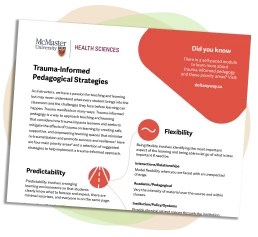Trauma-informed pedagogy. Simplified.

Download the Info-graphic
This info-graphic is a quick entry into four priority areas of trauma-informed pedagogy. There are a few strategies for each area to help you consider ways of implementing a trauma-informed approach. If you have more time, consider exploring the self-paced module which provides a more in-depth explanation and over 50 strategies.
Meet the Author
Sandra VanderKaay
Sandra VanderKaay is an assistant professor in the School of Rehabilitation Science and a CanChild Scientist at McMaster University. Her current program of research is focused on trauma-informed pedagogy, and clinical reasoning and ethical decision-making in occupational therapy practice, including ethical decision-making in school-based occupational therapy. Sandra’s post-doctoral fellowship at CanChild, under the supervision of Dr. Wenonah Campbell, focused on conducting realist research aimed at developing a middle-range theory of tiered rehabilitation services in education settings. Sandra completed her Ph.D. (2018) in the School of Rehabilitation Science at McMaster University under the supervision of Dr. Sandra Moll. Her thesis, titled Ethical Decision-Making in Occupational Therapy in Canada, involved three studies that looked at three distinct aspects of ethical decision-making to support occupational therapy practice. Sandra’s teaching foci include pediatric OT practice, clinical reasoning, and ethical decision-making. Sandra has been a registered occupational therapist since 1996. Her clinical background includes both school health support services and pediatric rehabilitation.
This resource shares the research of Dr. Sandra VanderKaay, McMaster University, to support educators in implementing trauma-informed pedagogy. This research was made possible through an IDEAS grant and a Fellowship in Teaching and Learning from MacPherson Institute with support from the School of Rehabilitation Sciences and the Faculty of Health Sciences.


